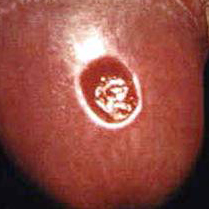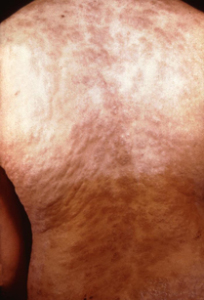(Sexually Transmitted Diseases)
What is syphilis?
 Syphilis is a sexually transmitted disease (STD) caused by a bacterium. Syphilis can cause long-term complications and/or death if not adequately treated.
Syphilis is a sexually transmitted disease (STD) caused by a bacterium. Syphilis can cause long-term complications and/or death if not adequately treated.
How common is syphilis?
CDC estimates that, annually, 55,400 people in the United States get new syphilis infections. There were 46,042 reported new cases of syphilis in 2011, compared to 48,298 estimated new diagnoses of HIV infection and 321,849 cases of gonorrhea in 2011. Of new cases of syphilis, 13,970 cases were of primary and secondary (P&S) syphilis, the earliest and most infectious stages of syphilis. In 2011, 72% of P&S syphilis occurred among men who have sex with men. There were also 360 reports of children with congenital syphilis in 2011.
How do people get syphilis?
Syphilis is transmitted from person to person by direct contact with syphilis sores. Sores occur mainly on the external genitals, vagina, anus, or in the rectum. Sores also can occur on the lips and in the mouth. Syphilis can be transmitted during vaginal, anal, or oral sexual contact. Pregnant women with the disease can pass it to their unborn children.
How quickly do symptoms appear after infection?
The average time between infection with syphilis and appearance of the first symptom is 21 days, but it can range from 10 to 90 days.
What are the symptoms in adults? Primary Stage
The appearance of a single sore marks the first (primary) stage of syphilis symptoms, but there may be multiple sores. The sore appears at the location where syphilis entered the body. The sore is usually firm, round, and painless. Because the sore is painless, it can easily go unnoticed. The sore lasts 3 to 6 weeks and heals regardless of whether or not a person is treated. However, if the infected person does not receive adequate treatment the infection progresses to the secondary stage.
Secondary Stage
Skin rashes and/or sores in the mouth, vagina, or anus (also called mucous membrane lesions ) mark the secondary stage of symptoms. This stage usually starts with a rash on one or more areas of the body. Rashes associated with secondary syphilis can appear from the time when the primary sore is healing to several weeks after the sore has healed. The rash usually does not cause itching. This rash may appear as rough, red, or reddish brown spots both on the palms of the hands and/or the bottoms of the feet. However, this rash may look different on other parts of the body and can look like rashes caused by other diseases.
 Large, raised, gray or white lesions may develop in warm, moist areas such as the mouth, underarm or groin region. Sometimes rashes associated with secondary syphilis are so faint that they are not noticed. Other symptoms of secondary syphilis include fever, swollen lymph glands, sore throat, patchy hair loss, headaches, weight loss, muscle aches, and fatigue. The symptoms of secondary syphilis will go away with or without treatment. Without appropriate treatment, the infection will progress to the latent and possibly late stages of disease.
Large, raised, gray or white lesions may develop in warm, moist areas such as the mouth, underarm or groin region. Sometimes rashes associated with secondary syphilis are so faint that they are not noticed. Other symptoms of secondary syphilis include fever, swollen lymph glands, sore throat, patchy hair loss, headaches, weight loss, muscle aches, and fatigue. The symptoms of secondary syphilis will go away with or without treatment. Without appropriate treatment, the infection will progress to the latent and possibly late stages of disease.
Late and Latent Stages
The latent (hidden) stage of syphilis begins when primary and secondary symptoms disappear. Without treatment, the infected person can continue to have syphilis in their body even though there are no signs or symptoms. This latent stage can last for years.
 About 15% of people who have not been treated for syphilis develop late stage syphilis, which can appear 10–30 years after infection began. Symptoms of the late stage of syphilis include difficulty coordinating muscle movements, paralysis, numbness, gradual blindness, and dementia. In the late stages of syphilis, the disease damages the internal organs, including the brain, nerves, eyes, heart, blood vessels, liver, bones, and joints. This damage can result in death.
About 15% of people who have not been treated for syphilis develop late stage syphilis, which can appear 10–30 years after infection began. Symptoms of the late stage of syphilis include difficulty coordinating muscle movements, paralysis, numbness, gradual blindness, and dementia. In the late stages of syphilis, the disease damages the internal organs, including the brain, nerves, eyes, heart, blood vessels, liver, bones, and joints. This damage can result in death.
How does syphilis affect a pregnant woman and her baby?
A pregnant woman with syphilis can pass the disease to her unborn baby. Babies born with syphilis can have many health problems. This may lead to low birth weight, premature delivery or even having a stillbirth (a baby born dead). To protect their babies, pregnant women should be tested for syphilis regularly during the pregnancy and at delivery and receive immediate treatment, if positive.
An infected baby may be born without signs or symptoms of disease. However, if not treated immediately, the baby may develop serious problems within a few weeks. Untreated babies can have many health problems (such as cataracts, deafness, or seizures), and they can die.
How is syphilis diagnosed?
A blood test is the most common way to determine if someone has syphilis. Shortly after infection, the body produces syphilis antibodies that can be detected by an accurate, safe, and inexpensive blood test.
Some health care providers can diagnose syphilis by examining material from a syphilis sore using a special microscope called a dark-field microscope. If syphilis bacteria are present in the sore, they will show up when observed through the microscope.
Special note: Because untreated syphilis in a pregnant woman can infect and kill her developing baby, every pregnant woman should receive prenatal care and be tested for syphilis during pregnancy and at delivery.
What is the link between syphilis and HIV?
Oral, anal, vaginal, or penile syphilis sores make it easier to transmit and acquire HIV infection. A person is 2 to 5 times more likely to get HIV if exposed when syphilis sores are present.
How is syphilis treated?
No home remedies or over-the-counter drugs will cure syphilis, but syphilis is simple to cure with appropriate antibiotics from a physician. Treatment will kill the syphilis bacterium and prevent further damage, but it will not repair damage already done.
Persons treated for syphilis must abstain from sexual contact with new partners until the syphilis sores are completely healed. Persons with syphilis must notify their sex partners so that they also can be tested and treated if necessary.
Who should be tested for syphilis?
Providers should routinely test persons who:
- are pregnant
- are men who have sex with men
- have HIV infection
- have partner(s) who have tested positive for syphilis
Will syphilis recur or “come back?”
Follow-up testing is recommended to be sure that treatment is successful. Having syphilis once does not protect a person from getting it again. Even following successful treatment, people can still be re-infected. Only laboratory tests can confirm whether someone has syphilis.
Because syphilis sores can be hidden in the vagina, anus, under the foreskin, or mouth, it may not be obvious that a sex partner has syphilis. Unless a person knows that their sex partners have been tested and treated, they may be at risk of getting syphilis again from an untreated sex partner.
How can syphilis be prevented?
Correct and consistent use of latex condoms can reduce the risk of syphilis when the sore or site of potential exposure is covered, but it is best to abstain from sex while any sore is present in the genital, anal, or oral area. Contact with a sore outside of the area covered by a latex condom can still cause infection.
The surest way to avoid transmission of sexually transmitted diseases, including syphilis, is to abstain from sexual contact or to be in a long-term mutually monogamous relationship with a partner who has been tested and is known to be uninfected.
Transmission of an STD, including syphilis, cannot be prevented by washing the genitals, urinating, and/or douching after sex. Any unusual discharge, sore, or rash, particularly in the groin area, should be a signal to abstain from having sex and to see a doctor immediately.
Avoiding alcohol and drug use may also help prevent transmission of syphilis because these activities may lead to risky sexual behavior. It is important that sex partners talk to each other about their HIV status and history of other STDs so that preventive action can be taken.
Where can I get more information?
Sexually Transmitted Diseases – Home Page
Syphilis – Topic Page
Syphilis and MSM – Fact Sheet
STDs and Pregnancy – Fact Sheet
Order Publications Online
STD information and referrals to STD Clinics
CDC-INFO
1-800-CDC-INFO (800-232-4636)
TTY: 1-888-232-6348
In English, en Español
